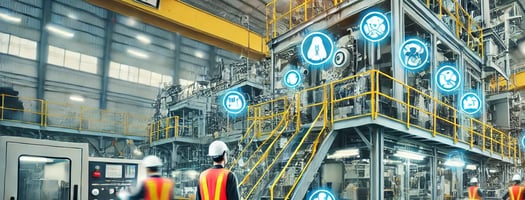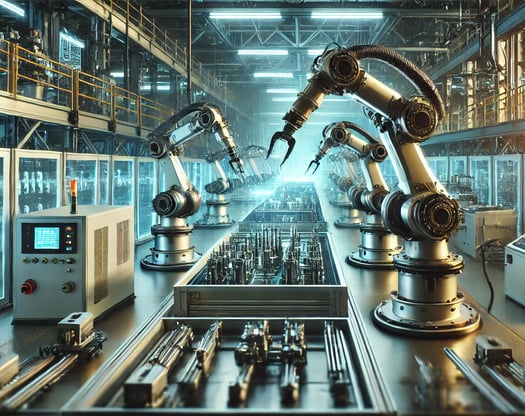
The Future of Columbus: Trends and Forecast
Explore the future of Columbus with trends and forecasts in technology, healthcare, and urban development.
COLUMBUSECONOMIC TRENDSMARKET TRENDSFRANKLIN COUNTY
George
8/2/20247 min read


Columbus, Ohio, a dynamic and ever-evolving city, stands at the cusp of transformative growth. As we delve into the future of Columbus, we uncover a tapestry woven from the threads of economic vitality, demographic shifts, and urban renewal. The city's trajectory is marked by burgeoning sectors such as technology, healthcare, and education, all poised to drive significant change. However, this bright future is not without its challenges. Columbus must navigate the complexities of maintaining affordability, enhancing infrastructure, and fostering sustainable development. This comprehensive exploration will shed light on the promising horizon of Columbus and the key factors shaping its future.
The Future of Columbus: Trends & Forecast
Economic and Demographic Trends
Introduction to the Future of Columbus
The future of Columbus is a canvas of potential and possibility. As Ohio's capital and largest city, Columbus has become a beacon of growth and innovation in the Midwest. With a population exceeding 915,000 residents, the city is experiencing a renaissance fueled by economic dynamism and a high quality of life. Columbus's strategic location, diverse economy, and robust educational institutions position it as a magnet for businesses and families alike. The city's forward-looking initiatives in technology, healthcare, and urban development are setting the stage for a vibrant future.
Columbus Economic & Demographic Trends


Economic Growth Projections
Columbus is poised for robust economic growth, driven by key industries and strategic investments. Over the next decade, the city's GDP is expected to see significant increases, reflecting its economic resilience and adaptability. Technology, healthcare, and finance stand out as primary drivers of this growth. The tech sector, in particular, is experiencing a boom, with Columbus emerging as a hub for startups and innovation hubs. Major corporations such as IBM and JPMorgan Chase have substantial operations in the city, contributing to job creation and economic stability.
The healthcare sector, anchored by institutions like OhioHealth and Nationwide Children's Hospital, continues to expand, promising not only job growth but also advancements in medical research and services. Finance and insurance, represented by giants like Nationwide Insurance, add another layer of economic strength, providing a diverse range of employment opportunities. The job market in Columbus is expected to flourish, with projections indicating strong growth across these key sectors, enhancing the city's economic landscape.
Population Growth and Demographics
Columbus is on a trajectory of steady population growth, driven by its appealing living conditions and economic opportunities. Over the next 5-10 years, the city's population is expected to swell, reflecting an influx of individuals and families attracted by the city's prospects. This growth is not only about numbers but also about the evolving demographic tapestry of Columbus. The city is becoming increasingly diverse, with a mix of racial and ethnic groups enriching its cultural fabric.
The demographic changes will have far-reaching implications for housing demand and public services. As more people call Columbus home, the need for housing, from affordable apartments to family homes, will rise sharply. This increased demand will likely strain the current housing supply, driving up prices and intensifying the need for new developments. Public services, including education, healthcare, and transportation, will need to scale up to meet the needs of a growing and diverse population, ensuring that Columbus remains a livable and vibrant city.




Key Sectors and Urban Development
Technology and Innovation
The technology sector in Columbus is on an upward trajectory, positioning the city as a significant tech hub in the Midwest. The expected growth in this sector is fueled by a robust ecosystem of startups, innovation hubs, and established tech companies. Research and development are at the heart of this tech boom, with major initiatives driving advancements and attracting top talent. The presence of institutions like Ohio State University further bolsters this growth, providing a steady stream of graduates ready to contribute to the tech landscape.
Innovation hubs, such as the Columbus Idea Foundry, are instrumental in fostering a culture of creativity and entrepreneurship. These hubs provide resources and networks for startups, helping them scale and succeed. Additionally, the city's commitment to smart city initiatives, including the integration of advanced technologies into urban infrastructure, positions Columbus as a leader in tech-driven urban development. This synergy between technology and urban planning is expected to create a more efficient, sustainable, and connected city.
Key Sectors & Urban Development in Columbus


Healthcare Expansion
The healthcare sector in Columbus is not just expanding; it's transforming. Major healthcare facilities are undergoing significant expansions, enhancing their capacity to serve a growing population. Institutions like OhioHealth, Nationwide Children's Hospital, and Mount Carmel Health System are leading this charge, with plans to add new facilities, upgrade existing ones, and expand their service offerings.
Job creation in the healthcare sector is expected to be robust, providing opportunities across a range of roles, from clinical positions to administrative and support staff. Innovations in healthcare delivery and medical research are also on the horizon, promising improved patient outcomes and positioning Columbus as a center of medical excellence. The city's focus on healthcare innovation is supported by partnerships with academic institutions, fostering a collaborative environment for cutting-edge research and development.




Education and Workforce Development
Educational institutions in Columbus, particularly Ohio State University, play a pivotal role in shaping the city's future. These institutions are not only centers of learning but also engines of economic growth and innovation. Ohio State University, one of the largest universities in the United States, attracts students, faculty, and researchers from around the world, contributing significantly to the local economy.
Workforce training programs are crucial in preparing residents for future job opportunities. Initiatives aimed at enhancing skills in high-demand areas such as technology, healthcare, and finance ensure that the local workforce is equipped to meet the needs of a dynamic job market. The contributions of local educational institutions to research and development further bolster Columbus's reputation as a hub of innovation. These institutions foster a culture of inquiry and discovery, driving advancements that benefit both the city and the broader region.


Urban Development and Infrastructure
Urban Revitalization Projects
Columbus is undergoing a wave of urban revitalization, with significant projects aimed at transforming the city's landscape. Downtown Columbus, in particular, is seeing a surge in redevelopment efforts, with new commercial, residential, and mixed-use projects reshaping the urban core. These projects are designed to attract businesses, residents, and visitors, creating a vibrant and dynamic downtown area.
Neighborhood revitalization is also a key focus, with efforts to improve the quality of life in various parts of the city. Initiatives aimed at enhancing infrastructure, increasing green spaces, and supporting local businesses are transforming neighborhoods and making them more attractive places to live. Mixed-use developments, which combine residential, commercial, and recreational spaces, are becoming increasingly popular, reflecting a trend towards more integrated and sustainable urban living.
Development & Infrastructure in Columbus




Infrastructure Improvements
Columbus is investing heavily in infrastructure improvements to support its growing population and economic activities. Transportation enhancements are a major focus, with plans to improve public transportation, road networks, and connectivity. Projects like the Smart Columbus initiative aim to integrate advanced technologies into the city's infrastructure, creating a more efficient and resilient urban environment.
Smart city initiatives are at the forefront of Columbus's infrastructure strategy, with efforts to implement technologies that enhance urban living. From intelligent traffic management systems to advanced energy grids, these initiatives are designed to improve the quality of life for residents while promoting sustainability. Green infrastructure projects, including the development of parks, greenways, and sustainable stormwater management systems, are also being prioritized, reflecting the city's commitment to environmental resilience.


Columbus, Ohio, is poised for a transformative future, driven by robust economic growth, demographic diversity, and innovative urban development. The city's technology sector, bolstered by startups and research institutions, is set to make Columbus a leading innovation hub in the Midwest. The healthcare sector's expansion promises job growth and medical advancements, reinforcing Columbus's status as a center of excellence. The steady population increase and growing diversity enrich the city's cultural fabric, but also necessitate strategic efforts to meet housing demand and enhance public services. Urban revitalization and infrastructure improvements are reshaping Columbus into a more connected, sustainable, and vibrant city.
However, Columbus must navigate challenges like maintaining affordability and promoting sustainable development. Strategic policies and community engagement are essential to ensure inclusive growth and environmental stewardship. By balancing economic dynamism with these efforts, Columbus can achieve a resilient and thriving future. Embracing innovation and leveraging its strengths will allow the city to continue prospering, providing a high quality of life for its residents and securing its place as a beacon of growth and opportunity.
Frequently asked questions
What are the key trends shaping the future of Columbus?
Key trends include economic growth, population increase, technological advancements, and urban development.
Which industries are expected to drive Columbus' economic growth?
Technology, healthcare, education, and finance are expected to be major drivers of economic growth.
What challenges does Columbus face in its future growth?
Challenges include maintaining affordability, enhancing infrastructure, and promoting sustainable development.
Related Posts











